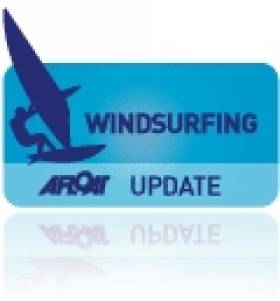Displaying items by tag: Katie McAnena
Windsurfing Champion Katie McAnena Catches Mullaghmore Head
Four years after windsurfing off Sligo’s Mullaghmore Head, Katie McAnena took advantage of the right wind and weather conditions to catch the infamous surf break again.
As The Irish Independent reports, the Galway-born GP launched her windsurf board late last month off Mullaghmore harbour.
With her on jetski was Chris McGloin to provide tow support.
 Galway-born GP launched her windsurf board late last month off Mullaghmore harbour Photo: Clem McInerney
Galway-born GP launched her windsurf board late last month off Mullaghmore harbour Photo: Clem McInerney
“It’s exhilarating, the might of it and the sound of the ocean rumbling and roaring in your ears and vibrating under your feet,” McAnena told the newspaper.
“You’re looking at Ben Bulben and Ben Wiskin and Classiebawn castle and there can be dolphins, and it is just such a buzz to feel the power of Mullaghmore,” she said.
 Conditions need to include a low Spring tide and a south-westerly wind to ride record waves at Mullaghmore Photo: Clem McInerney
Conditions need to include a low Spring tide and a south-westerly wind to ride record waves at Mullaghmore Photo: Clem McInerney
She explained that conditions need to include a low Spring tide and a south-westerly wind – as well as having to be “in the right frame of mind”.
McAnena became the world’s first woman to windsurf “Jaws”, the surf break at Pe’ahi in Hawaii that can generate waves of more than 18 metres high, during a gap year from her medical studies in 2013.
Four years ago, she and her husband Finn Mullen were among five people to windsurf a record wave at Mullaghmore, recorded by videographer Clem McInerney.
She secured her tenth national windsurfing title in the highly competitive national wave championships in Kerry’s Brandon Bay off Castlegregory, Co Kerry, last October.
First Irish Woman To Windsurf Infamous Hawaiian Wave
#Windsurfing - History has been made in Hawaii with the first Irish woman ever to have windsurfed the infamous 'Jaws' surfing break, as The Irish Times reports.
Twenty-six-year-old Katie McAnena, a doctor from Galway, demonstrated perfect timing as she leapt into the water from an overhanging cliff.
An experienced windsurfer with four Irish women's championships to her name, McAnena told the paper how she maintained caution on the wave and stayed on its shoulder to ride it out.
“The sound and the feeling of it going through my bones was extraordinary, an out-of- body experience,” she said. “I haven’t managed to sleep since.” The Irish Times has more on the story HERE.
It's been an exciting time lately for Ireland's women waverers, as just six months ago northwest surfing scion Easkey Britton became the first woman ever to surf in the waters off Iran.
























































